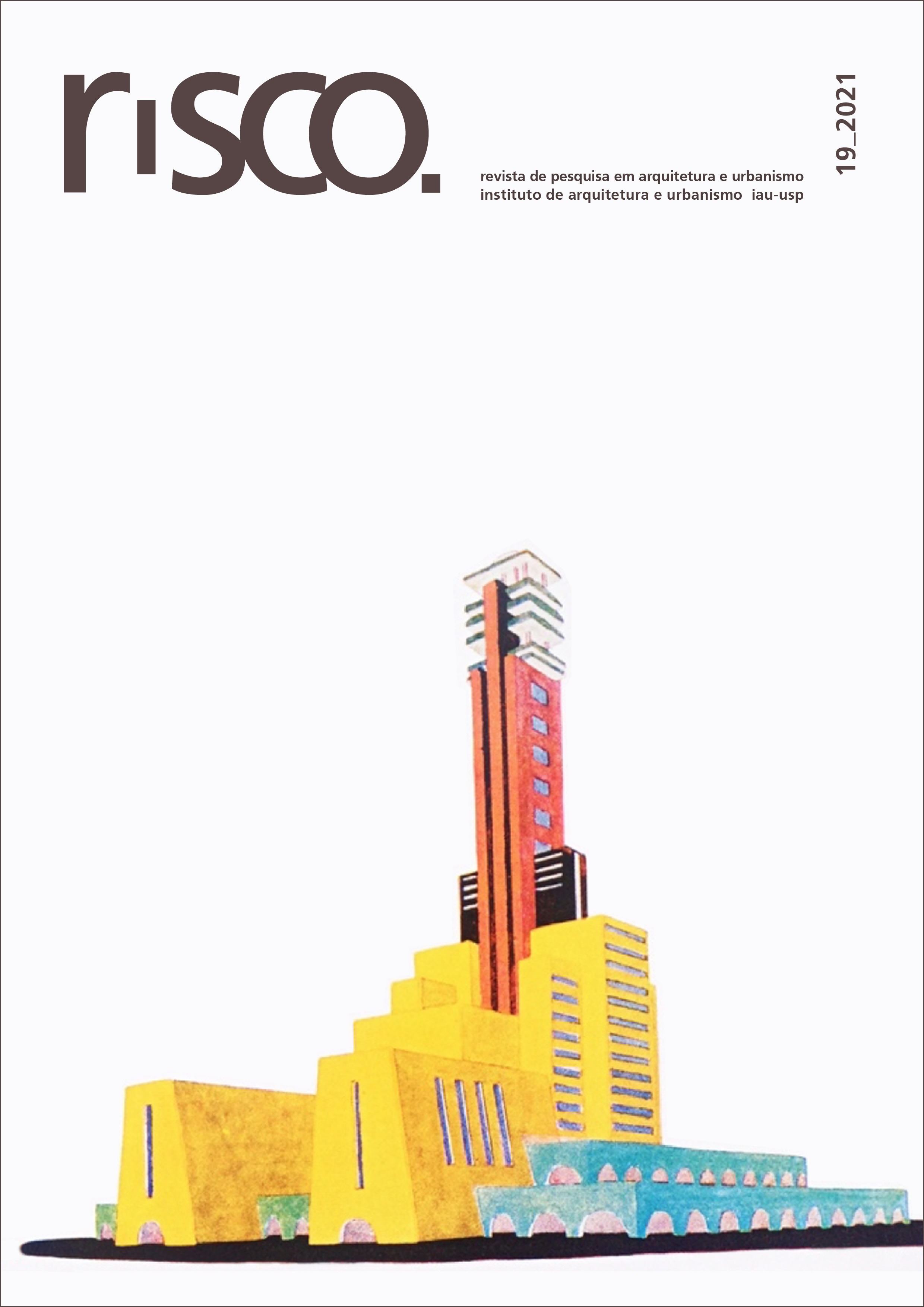Slow Cities: an experience of contemporaneity
DOI:
https://doi.org/10.11606/1984-4506.risco.2021.153236Keywords:
Identity, Liquid Modernity, Slow cityAbstract
In modernity capitalism is the social order on the rise, the capital emerges to desterritorialize and change the relationship of people and institutions over time, with their identities and with the territory. In a globalized world, cities walk to Homogenization. "Fluidity", speed and instability (traces of a modern liquid society) make social movements appear contrary to this logic and that begin to question their effects on individuals, showing that there is an alternative to a more balanced life and Healthy, slow movement is one of them and among its aspects, the slow cities movement emerges and brings to the reflection the need to rethink life in contemporary cities and the need for humanization and redemption of identities in these spaces.
Downloads
References
ARINS, H. B.; VAN BELLEN, H. M. Movimento Slow: uma análise sob a ótica dos enclaves do eco desenvolvimento (2009). Disponível em: < https://bit.ly/2KPRosA>. Acesso em: 03 de abril de 2018
AUGÉ, Marc. (1992), Não lugares: introdução a uma antropologia da sobremodernidade. 1ª edição francesa. Lisboa, 90 Graus
BATISTA, Klein, M., & Iochins Grisci, C., & Gallon, S., & Dantas de Figueiredo, M. (2013). SLOW MOVEMENT: TRABALHO E EXPERIMENTAÇÃO DO TEMPO NA VIDA LÍQUIDO-MODERNA. Psicologia & Sociedade, 25 (1), 30-39.
BAUDELAIRE, Charles. Sobre a Modernidade. Trad. Teixeira Coelho. Rio de Janeiro: Paz e Terra, 1996. Coleção Leitura, p.25
BAUMAN, Zigmunt (2009). Vida Líquida; tradução Carlos Alberto Medeiros. – 2. ed. – Rio de Janeiro: Zahar
BAUMAN, Zigmunt (2001). Modernidade Líquida; tradução Plínio Dentzien. – Rio de Janeiro: Zahar.
BAUMAN, Zigmunt (2008). Vida para consumo; tradução Carlos Alberto Medeiros. – Rio de Janeiro: Zahar.
CASTELLS, M. A (2000). Sociedade em Rede. São Paulo: Paz e Terra (4ª Edição).
CARP, Jana. The Importance of “Slow” for Liveable Cities. Disponível em: <https://bit.ly/2I2ASaN>. Acesso em: 02 de abril de 2018.
CEDRO, Marcelo. A Modernidade em Marx e em Weber Disponível em: <https://bit.ly/2jIsA9w> Acesso em: 01 de maio de 2018.
CITTA SLOW. Disponível em: <http://www.Cittaslow.org.html>. Acessado em 20 de abril de 2018.
GAULEJAC, V. (2007). Gestão como doença social: ideologia, poder gerencialista e fragmentação social. Aparecida, SP: Idéias & Letras.
GIDDENS, Antony (1991), Conseqüências da Modernidade. Trad. Raul Fixer. São Paulo: Unesp.
HALL, Stuart (1998). A identidade cultural na pós-modernidade; tradução Tomaz Tadeu da Silva e Guacira Lopes Louro: Rio de Janeiro: DP&A.
HARVEY, David (1999). Condição pós-moderna. 8ª ed. trad.:Adail Ubirajara, Maria Stela. São Paulo: Loyola. p.107
HAESBAERT, R. Territórios alternativos. São Paulo: Contexto, 2002.
HOBSBAWM, Eric J. (1991). A era das revoluções: Europa 1789-1848. Rio de Janeiro: Paz e Terra.
HONORÉ, Carl (2004). In Praise of Slow: How a Worldwide Movement Is Challenging the Cult of Speed. 1ª ed. Grã-Bretanha.
HORKHEIMER, M. Eclipse da razão. Tradução Sebastião Uchoa Leite. Rio de Janeiro: Ed. Labor, 1976.
JACOBS, Jane Morte e vida de grandes cidades (2011) / Jane Jacobs; tradução Carlos S. Mendes Rosa; revisão da tradução Maria Estela Heider Cavalheiro; revisão técnica Cheila Aparecida Gomes Bailão. – 3 ed. – São Paulo: Editora WMF Martins Fontes – (Coleção cidades)
LATOUCHE, S. (1989). LIOccidentalisafion du Monde: essai sur Ia signifícation, la Portée et les limites de l'uniformisation planétaire. Paris: La Découverte.
MAYER, Heiki and KNOX, Paul L. Slow Cities: Sustainable in a fast word. Disponível em: <https://bit.ly/2I8aE2J>. Acesso em: 01 de março de 2018.
NAIGEBORIN, Mariana Barrichello (2011). O Movimento devagar e seu significado plural na contemporaneidade mutante. Dissertação (Mestrado em Ciências da Comunicação). ECA, Universidade de São Paulo, São Paulo.
PEGADA ECOLÓGICA? O QUE É ISSO?. WWF Disponível em: https://www.wwf.org.br/natureza_brasileira/especiais/pegada_ecologica/o_que_e_pegada_ecologica/. Acesso em: 26 de dezembro de 2018.
ROBINS, K. (1991). Tradition and translation: national culture in its global context”. In Corner, J. and Harvey, S. (orgs). Enterprise and Heritage: Crosseuness of National Culture, Londres: Routledge.
SALAMI, Roozbeh. The Slow City Movement as an Alternative Approach to Sustainable Development: Assessments in Seferihisar, Turkey. Disponível em: <https://bit.ly/2rvAIOJ> Acesso em: 01 de abril de 2018.
SAQUET, Marcos Aurelio; SPOSITO, Eliseu Savério (org). Territórios e territorialidades: teorias, processos e conflitos (2009). 1º ed. São Paulo: Expressão Popular: UNESP. Programa de Pós-Graduação em Geografia.
Downloads
Published
Issue
Section
License
Copyright (c) 2021 Eloisa Estrela Oliveira

This work is licensed under a Creative Commons Attribution-NonCommercial-ShareAlike 4.0 International License.
Autores que publicam nesta revista concordam com os seguintes termos:
a. Autores mantém os direitos autorais e concedem à revista o direito de primeira publicação, com o trabalho simultaneamente licenciado sob a Licença Creative Commons Attribution BY-NC-SA que permite o compartilhamento do trabalho com reconhecimento da autoria e publicação inicial nesta revista.
b. Autores têm autorização para assumir contratos adicionais separadamente, para distribuição não-exclusiva da versão do trabalho publicada nesta revista (ex.: publicar em repositório institucional ou como capítulo de livro), com reconhecimento de autoria e publicação inicial nesta revista.
c. Autores têm permissão e são estimulados a publicar e distribuir seu trabalho online (ex.: em repositórios institucionais ou na sua página pessoal) a qualquer ponto antes ou durante o processo editorial, já que isso pode gerar alterações produtivas, bem como aumentar o impacto e a citação do trabalho publicado (Veja O Efeito do Acesso Livre).

















